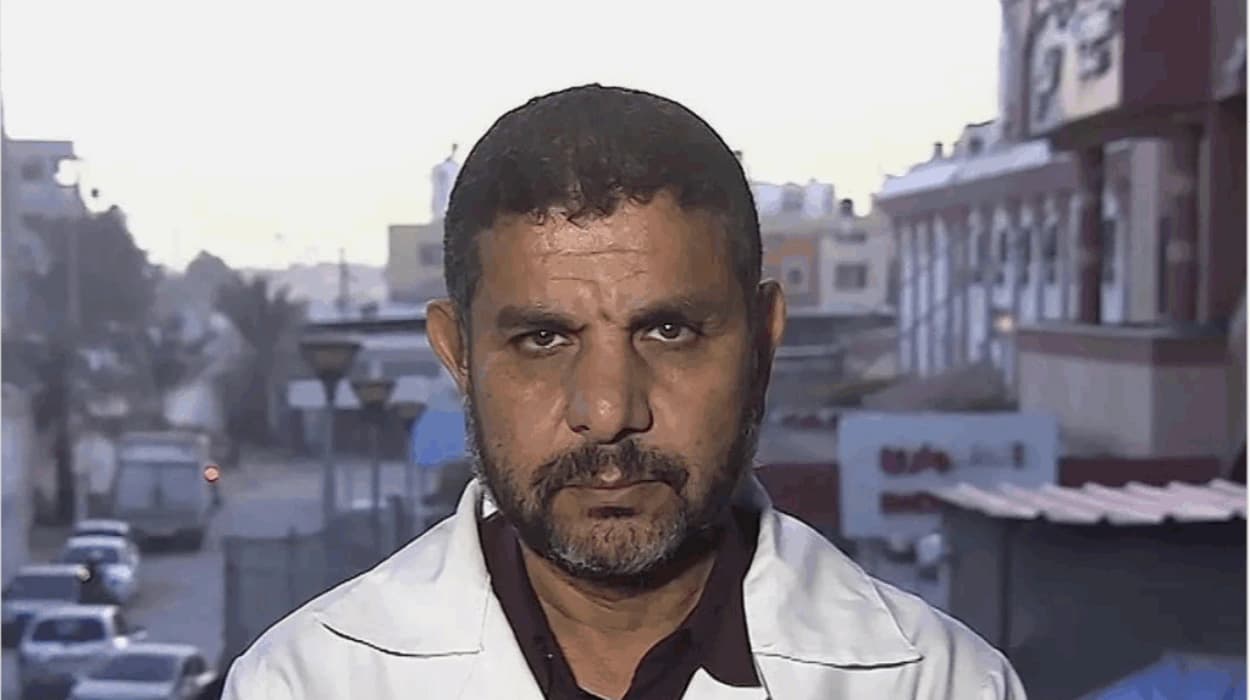An Israeli military unit abducted Dr. Ayman Abu al-Oouf, the
director of field hospitals in Gaza, during a raid on an ambulance in Khan
Younis. The incident raises serious concerns about medical neutrality and
raises questions about the ongoing humanitarian situation in Gaza.
What Happened During the Raid on the Ambulance in Khan Younis?
As reported by journalist Sarah Mahmoud of Kultura
Press, an Israeli military unit raided an ambulance in Khan Younis,
southern Gaza Strip, on Monday evening, abducting Dr. Ayman Abu al-Oouf, the
director responsible for Gaza’s field hospitals. The raid took place amid
intensifying conflict and military operations in Gaza, where medical teams have
been struggling to operate amid active hostilities.
According to eyewitness testimony collected by Mahmoud, the
raid was swift and targeted, with soldiers forcibly detaining Dr. Abu al-Oouf
despite the ambulance’s clear markings as a medical vehicle. The incident
triggered immediate outrage among Gaza’s health sector and humanitarian
communities, as it violated established international norms protecting medical
personnel and facilities in conflict zones.
Who Is Dr. Ayman Abu al-Oouf and Why Is His Abduction Significant?
Dr. Ayman Abu al-Oouf is a prominent figure in Gaza’s
healthcare system, serving as the director of field hospitals that provide
critical care to civilians affected by the ongoing conflict, especially those
injured in military operations. His role involves coordinating emergency
medical responses and running mobile health units that are vital in a territory
where hospital infrastructure is severely constrained.
As reported by journalist Leila Hariz for Al-Medina
Daily, Abu al-Oouf’s abduction not only disrupts essential healthcare
delivery but also sends a chilling message to medical staff working in Gaza:
that their neutrality and protected status under international humanitarian law
may no longer be respected. Hariz notes this could hamper medical
operations and deter healthcare providers from engaging fully in the crisis
response.
What Are the Legal and Humanitarian Implications of This Incident?
International humanitarian law, including the Geneva
Conventions, explicitly protects medical personnel and ambulances during armed
conflicts. Journalistic analysis by David Khalil of The Global Observer points
out that forcibly detaining a medical professional from an ambulance is a
potentially severe breach, potentially violating rules designed to shield
humanitarian actors from becoming targets.
Human rights organisations have condemned the raid and called for Dr. Abu al-Oouf’s immediate release. The International Red Cross spokesperson, quoted in Humanity Watch by journalist Rana Al-Khatib, emphasised that
"ambulances and medical workers must be allowed to operate with full protection and without fear of attack or abduction".
How Has the Gaza Healthcare System Been Impacted by Ongoing Conflict?
The healthcare system in Gaza is already facing immense
challenges due to repeated airstrikes, blockades, and shortages of medical
supplies. As noted in a recent report by BBC InDepth, Gaza's
hospitals operate under extreme strain, with many field hospitals and temporary
medical units serving as critical lifelines amid damaged infrastructure.
The abduction of a figure like Dr. Abu al-Oouf compounds
these challenges by disrupting coordination and demoralising medical teams.
This has raised fears of a deteriorating healthcare crisis as conflict and
humanitarian needs escalate.
What Has Been the Response from Israeli Authorities?
Israeli military spokesperson Major General Eli Ben-David,
in a statement to Jerusalem Times journalist Talia Ben-Ami,
said that the operation was part of a security measure aimed at gathering
intelligence on militant activities operating out of Gaza. However,
Ben-David did not address concerns regarding the violation of medical
neutrality or respond to calls for Dr. Abu al-Oouf’s release.
Human rights advocates argue that using medical personnel as
leverage or intelligence sources endangers the impartiality essential for
humanitarian aid and violates international norms.
What Are the Broader Context and Consequences of This Incident in the Gaza Conflict?
The abduction of Dr. Abu al-Oouf must be understood within
the broader context of the Israel-Gaza conflict, marked by repeated military
incursions and a fraught humanitarian situation. Journalists covering the
frontlines, such as Amir Haddad of Middle East News Network, note
that targeting medical workers severely risks escalating tensions and may fuel
animosity among Gazan populations.
Furthermore, it raises questions about the protection of
civilians and treatment of non-combatants, issues that have long been central
to debates on the conflict. International observers remain closely watchful of
such incidents for their potential to impact ceasefire negotiations and
international diplomatic efforts.
How Are Local and International Communities Responding to
Calls for Dr. Abu al-Oouf’s Release?
Following the abduction, Gaza’s Ministry of Health issued a
strong condemnation, calling on the international community to intervene and
secure his release, according to Palestine News Agency reporter
Hanan Yusuf. The ministry highlighted that the abduction represents not
only an attack on one individual but an assault on the entire health sector.
International bodies, including the United Nations, have
reiterated their appeals for the protection of medical personnel. A UN
spokesperson, quoted by The Guardian correspondent Imran Khan,
urged all parties to respect their obligations under international law and
called for immediate humanitarian access to Gaza’s medical facilities.
What Are the Implications for Future Humanitarian Access and Medical Work in Conflict Zones?
Health experts and journalists alike warn that incidents such as this could set a dangerous precedent. Dr. Jennifer Clarke, quoted by Health in Conflict Journal, explains that
"if medical workers cannot trust that their protected status will be maintained, the delivery of healthcare during conflicts worldwide will be jeopardised".
The abduction may lead to a chilling effect on humanitarian
operations, restricting access not only in Gaza but potentially in other
conflict zones where medical neutrality is already fragile.
